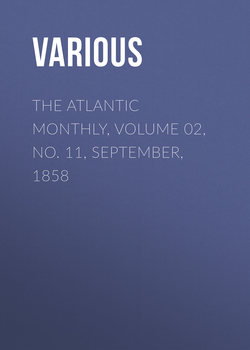Читать книгу The Atlantic Monthly, Volume 02, No. 11, September, 1858 - Various - Страница 8
ELOQUENCE
CHAPTER XVIII
ОглавлениеMark and Mr. Alford, after their disagreeable interview with the Clamps, went to see Mr. Hardwick, whom they wished to congratulate. At the door they were met by Lizzie, whose sad face said, "Hush!" Mark's spirits fell instantly. "Is he worse?" he asked. A tear was the only answer. He asked Mr. Alford to go for Mildred. "She has just come," said Lizzie.
They found Mr. Hardwick propped up in bed, whence he could look out of the window. The church-spire rose on the one hand, and on the other the chimney of the shop was seen above the trees on the river-bank. By night the column of sparks had gladdened his eye, as he thought of the cheerful industry of his sons. Mark tenderly pressed his uncle's hand, and leaned over him with an affectionate, sorrowing interest.
"Der-don't take it to heart, my boy," said Mr. Hardwick. "I am very h-happy."
"I am glad that the boys won't lose the shop," said Mark. "I see you are looking out to the chimney."
"Yer-yes, it was thoughtful of Mr. Kinloch, and a special Pr-Providence that the will was found."
"You know he mentioned his claim against me," said Mark; "that is paid, and it doesn't matter; but I can't guess the reason for the unusual kindness he has shown towards me."
The old man answered slowly, for his breathing was difficult and often painful.
"It is an old story,—old as the dried f-flowers that Mildred told me of,—but it had a f-fragrance once. Yer-your mother, Mark, was as per-pretty a girl as you'd often see. Walter Kinloch ler-loved her, and she him. He sailed to the Indies, an' some der-diff'culty happened, so that the letters stopped. I d-don't know how 'twas. But arter a while sh-she married your father. Mr. Kinloch, he m-married, too; but I guess he nun-never forgot the girl of his choice."
Mark grasped his young wife's hand, at this tale of years gone by.
"The lock of hair and the rose were your mother's, then!" she whispered. "Dear father! faithful, even in death, to his friends, and to the memory of his first love! How much suffering and crime would have been prevented, if he could only have uttered the words which his heart prompted!"
"God forgive the woman!" said Mr. Hardwick, solemnly. None knew then how much she had need of forgiveness, standing as she was on the brink of that last fatal plunge!
Mr. Alford suggested that the fatigue of talking would wear upon the enfeebled man, and advised that he should be left to get some rest, if possible.
"To-morrow is S-Sabba'-day, ef I've counted right," said Mr. Hardwick.
"I sh-should like to see the sun on the st-heeple once more."
"Dear uncle, I hope you may see it a great many times. We must leave you to rest."
"Good-night, mum-my children," he replied. "God b-bless you all! Let me put my hands on your h-heads."
They knelt by his bedside, and he blessed them fervently. Mr. Alford and Lizzie remained to attend upon him, and the others withdrew.
The night passed, how wearily! None could sleep, for through all the air there was a presage of sorrow, a solemn "tingling silentness," to which their senses were painfully alive. Who, that has passed the interminable gloomy hours that preceded the departure of a loved and venerated friend into the world of spirits, does not remember this unutterable suspense, this fruitless struggle with eternal decrees, this clinging of affection to the parting soul? What a sinking of the heart even the recollection of such a scene produces!
The day dawned upon sleepless, tear-stained eyes. The dying man was conscious, cheerful, and calmly breathing. In the adjoining room the family sat beside the table on which was spread their untasted breakfast.
The bell began to ring for meeting. Mr. Hardwick roused up at the sound, and called for his children. He blessed them again, and placed his hands on their bowed heads in turn. He thought of the psalms which he had so often led, and he asked all to join in singing Billings's "Jordan."
"There is a land of pure delight,
Where saints immortal reign;
Infinite day excludes the night,
And pleasures banish pain."
With faltering voices they sang the triumphal hymn. The old man's eyes were fixed upon the steeple, which pointed upward through the clear air, and shone in the golden light of the sun. He kept time with a feeble movement, and once or twice essayed to raise his own wavering voice. A smile of heavenly beauty played over his pallid features as the music ceased,—a radiance like that crimson glow which covers the mountain-top at dawn. He spoke almost inaudibly, as if in a trance; then repeating with a musical flow the words of his favorite author,
"Where the bright seraphim in burning row
Their loud uplifted angel-trumpets blow,
And the cherubic host in thousand choirs
Touch their immortal harps of golden wires,
With those just spirits that wear victorious palms
Hymns devout and holy psalms
Singing everlastingly,"—
his voice sank again, though it was easy to see that a prayer trembled on his lips. As a strain of music fades into silence, his tones fell away, fainter and fainter; and with the same seraphic light on his countenance his breathing ceased.
